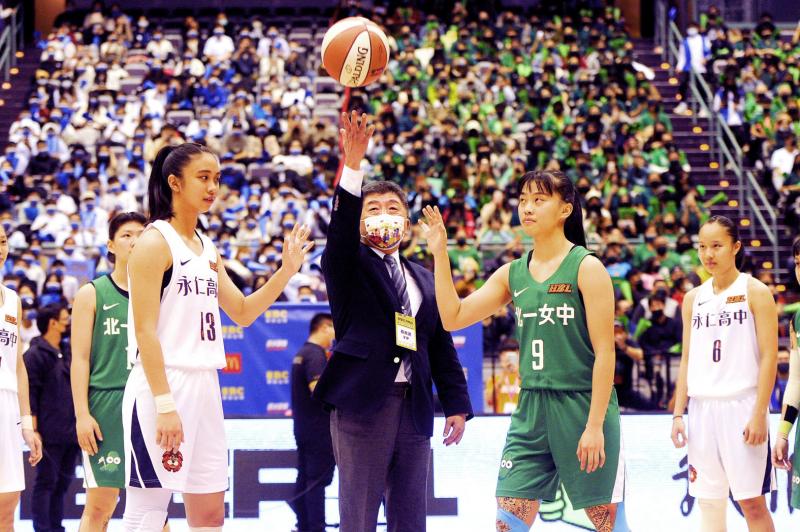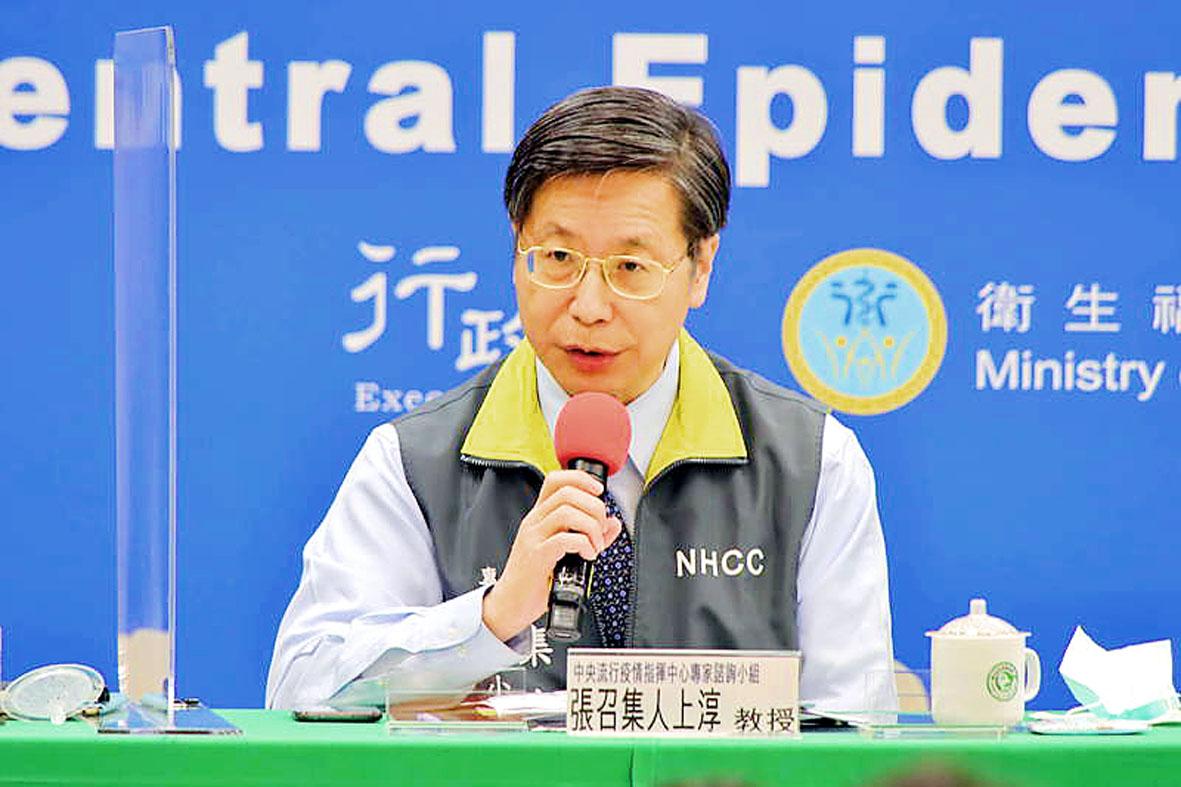The Central Epidemic Command Center (CECC) yesterday reported seven imported cases of COVID-19 and the death of a person who had the virus, bringing the nation’s toll from the disease to 10.
Case No. 935, a Taiwanese man in his 60s, who had a history of diabetes and hypertension, died on Friday, said Minister of Health and Welfare Chen Shih-chung (陳時中), who heads the center.
The man, who had been working in Myanmar since January last year, began experiencing symptoms on Dec. 24 last year, tested positive on Dec. 29 and was hospitalized the following day, Chen said.

Photo: Lin Cheng-kung, Taipei Times
The man was released from the hospital on Jan. 27, but was again hospitalized on Feb. 3, after he reported difficulty breathing, Chen said, adding that the man returned to Taiwan on a chartered air ambulance on Feb. 7, when he was again hospitalized.
The man, who was dependent on a ventilator, was placed on extracorporeal life support on Monday, and died from multiple organ failure on Friday, Chen said.
CECC specialist advisory panel convener Chang Shan-chwen (張上淳) said the man had severe pneumonia, and later experienced kidney failure and multiple organ dysfunction syndrome.

Photo courtesy of the Central Epidemic Command Center
Antibacterial agents, steroid medication and immunoglobulins were used as treatment, he said, adding that data from several countries have shown worse prognoses for COVID-19 patients with chronic diabetes and hypertension.
The seven imported cases are all fishers — two Indonesian men and five Filipinos — who are in their 20s to 40s, Chen said.
They all provided a negative polymerase chain reaction (PCR) test result from within three days before boarding a plane to Taiwan, and arrived on Feb. 19 without showing any symptoms, he said.
They were tested on Thursday, after completing centralized quarantine, and the results came back positive yesterday, Chen said, adding that no close contacts were identified, as they stayed in single rooms during quarantine after arriving in Taiwan.
A total of 967 cases have been confirmed in Taiwan, with 851 identified as imported cases. Twenty-five people remain isolated in hospitals, the CECC said.
Meanwhile, Vietnam on Friday reported that a Taiwanese traveler was confirmed to have COVID-19.
The person, who tested negative for the virus at Taichung Veterans General Hospital on Feb. 17, flew to Vietnam on Feb. 19 and tested negative again the following day, Chen said.
However, the person tested positive in a second test on Thursday while in quarantine in a single room at a hotel, he said.
CDC Deputy Director-General Chuang Jen-hsiang (莊人祥), who is the CECC’s spokesman, said the case is the fifth in which travelers from Taiwan have tested positive in Vietnam.
The first two cases were later determined to have likely contracted the disease while in centralized quarantine in Vietnam, and all the close contacts of the two latter cases tested negative in PCR and antibody tests in Taiwan, Chuang said.
The CECC would still conduct contact tracing on the new case, and four close contacts have already been identified, he said.

‘TAIWAN-FRIENDLY’: The last time the Web site fact sheet removed the lines on the US not supporting Taiwanese independence was during the Biden administration in 2022 The US Department of State has removed a statement on its Web site that it does not support Taiwanese independence, among changes that the Taiwanese government praised yesterday as supporting Taiwan. The Taiwan-US relations fact sheet, produced by the department’s Bureau of East Asian and Pacific Affairs, previously stated that the US opposes “any unilateral changes to the status quo from either side; we do not support Taiwan independence; and we expect cross-strait differences to be resolved by peaceful means.” In the updated version published on Thursday, the line stating that the US does not support Taiwanese independence had been removed. The updated

‘CORRECT IDENTIFICATION’: Beginning in May, Taiwanese married to Japanese can register their home country as Taiwan in their spouse’s family record, ‘Nikkei Asia’ said The government yesterday thanked Japan for revising rules that would allow Taiwanese nationals married to Japanese citizens to list their home country as “Taiwan” in the official family record database. At present, Taiwanese have to select “China.” Minister of Foreign Affairs Lin Chia-lung (林佳龍) said the new rule, set to be implemented in May, would now “correctly” identify Taiwanese in Japan and help protect their rights, the Ministry of Foreign Affairs said in a statement. The statement was released after Nikkei Asia reported the new policy earlier yesterday. The name and nationality of a non-Japanese person marrying a Japanese national is added to the

AT RISK: The council reiterated that people should seriously consider the necessity of visiting China, after Beijing passed 22 guidelines to punish ‘die-hard’ separatists The Mainland Affairs Council (MAC) has since Jan. 1 last year received 65 petitions regarding Taiwanese who were interrogated or detained in China, MAC Minister Chiu Chui-cheng (邱垂正) said yesterday. Fifty-two either went missing or had their personal freedoms restricted, with some put in criminal detention, while 13 were interrogated and temporarily detained, he said in a radio interview. On June 21 last year, China announced 22 guidelines to punish “die-hard Taiwanese independence separatists,” allowing Chinese courts to try people in absentia. The guidelines are uncivilized and inhumane, allowing Beijing to seize assets and issue the death penalty, with no regard for potential

‘UNITED FRONT’ FRONTS: Barring contact with Huaqiao and Jinan universities is needed to stop China targeting Taiwanese students, the education minister said Taiwan has blacklisted two Chinese universities from conducting academic exchange programs in the nation after reports that the institutes are arms of Beijing’s United Front Work Department, Minister of Education Cheng Ying-yao (鄭英耀) said in an exclusive interview with the Chinese-language Liberty Times (the Taipei Times’ sister paper) published yesterday. China’s Huaqiao University in Xiamen and Quanzhou, as well as Jinan University in Guangzhou, which have 600 and 1,500 Taiwanese on their rolls respectively, are under direct control of the Chinese government’s political warfare branch, Cheng said, citing reports by national security officials. A comprehensive ban on Taiwanese institutions collaborating or